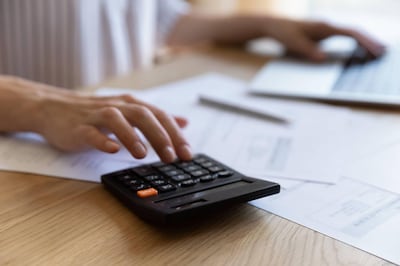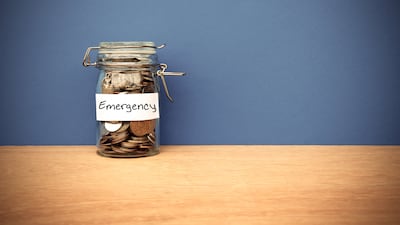The Covid-19 pandemic exposed people’s financial vulnerabilities and a lack of emergency funds required to survive difficult economic times as millions were either laid off or furloughed around the world.
An emergency fund is money set aside for the purpose of unexpected financial commitments, such as a medical emergency, a job loss or unplanned car or home repairs. It is usually a static number equal to three to six months of your expenses.
Half of all Americans would experience financial hardship if they had to meet an emergency expense of $1,000 or less in the next 30 days, according to a Charles Schwab Financial Literacy survey conducted in 2020.
“Most individuals use high interest rate credit cards to cover unexpected bills, which leaves them in debt,” says Arun Leslie John, chief market analyst at Century Financial.
“Creating an emergency fund eliminates the need to rely on debt to absorb a financial shock.”
Chris Keeling, a chartered financial planner at The Fry Group, says a minimum of six months’ worth of living expenses should be readily available in a savings account.
“This means if your total monthly outgoings are Dh10,000 per month, your emergency fund should be at least Dh60,000. The larger the emergency fund, the better you will be able to cope with any sudden change to your personal or professional circumstances,” he says.
We asked personal finance experts to list their top tips on how to build an emergency fund.
1. Start with small, regular contributions
Rather than aiming for six months’ worth of expenses right away, plan for one month or even two weeks to make your first goal achievable, says Sophia Bhatti, a partner at Hoxton Capital Management.
Making small, regular contributions to your emergency fund is recommended, says Mr Keeling.
Deduct an amount you feel is comfortable when you receive your salary each month and build up your emergency fund over time, he says.
Reaching that first goal can give you the motivation to keep going, Ms Bhatti adds.
“Set your second goal higher — and the third even higher,” she says. “By then, saving will have become a habit and the positive motivation you are building by reaching the smaller goals will help propel you towards larger ones.”
2. Set your budget and target date
It is important to know where your money is going to find ways to save, says Ms Bhatti.
“Budgeting is a useful tool that can help you calculate income and expenses to provide a dashboard view of your financial situation and find ways to reduce or manage your spending,” she says.
Setting a target date can also be helpful in reaching your goal faster. Depending on your current financial situation, set a date for achieving your goal for the emergency fund, she says.
3. Open a separate savings account
It is wise to open an additional savings account for the emergency fund to separate your savings from your day-to-day spending account, Mr Keeling says.
“You will be less tempted to eat into your savings and have a clearer idea of how much you have available to spend. Ensure the savings account is instantly accessible in case you need to access the funds quickly,” he adds.
However, it is important not to withdraw any amount from this account until you meet your emergency fund target, Ms Bhatti says.
It can be tempting to dip into the savings pot at times but if you remain disciplined, you can avoid it unless absolutely necessary, Mr Keeling says.
If you have to access your emergency fund, ensure you replenish it when possible for use again in the future, he says.

4. Automate your savings
Ms Bhatti recommends setting up an auto-debit feature on the account in which you receive your salary to ensure you meet your monthly commitment towards the emergency fund.
“Schedule the date for this transfer as close as possible to your income credit date so that you don’t get an opportunity to spend this amount on other discretionary expenditures,” she says.
it is easy to set up regular payments via online banking or use a standing instruction to automatically transfer to your emergency fund, Mr Keeling says.
This ensures you won’t forget to save and gives you a clear understanding of what remains in your day-to-day account for spending, he says.
However, the simplest method to save money is to never touch it at all, Mr Leslie John of Century Financial, says
“Some employers offer direct deposit, and some also deposit to multiple accounts. It is advised to have a predetermined contribution amount deposited automatically to the separate account, either by the employer or the bank,” he says.
Don’t watch the account balance continually as this will only make growth seem smaller and slower. Instead, forget about it and let time do its thing, Ms Bhatti says.
5. Take advantage of one-time opportunities
There may be certain times during the year when people have an influx of money. For many, the annual bonus can be one of the larger cheques they receive all year, Mr Leslie John says.
“Although it may be tempting to spend this money, saving some or all of it could help to build an emergency fund quickly,” he says.
Individuals can also consider investing in financial markets to cope with inflation and simultaneously create an emergency fund, Mr Leslie John says.
“Families could think about locking in their rents for a longer period to take advantage of any future price increases by their landlords and, in turn, save money.”
Setting spending limits on credit cards is also a smart idea, he says.
“This prevents overpaying and encourages one to plan time for daily expenses and consequently save for an emergency fund.”


